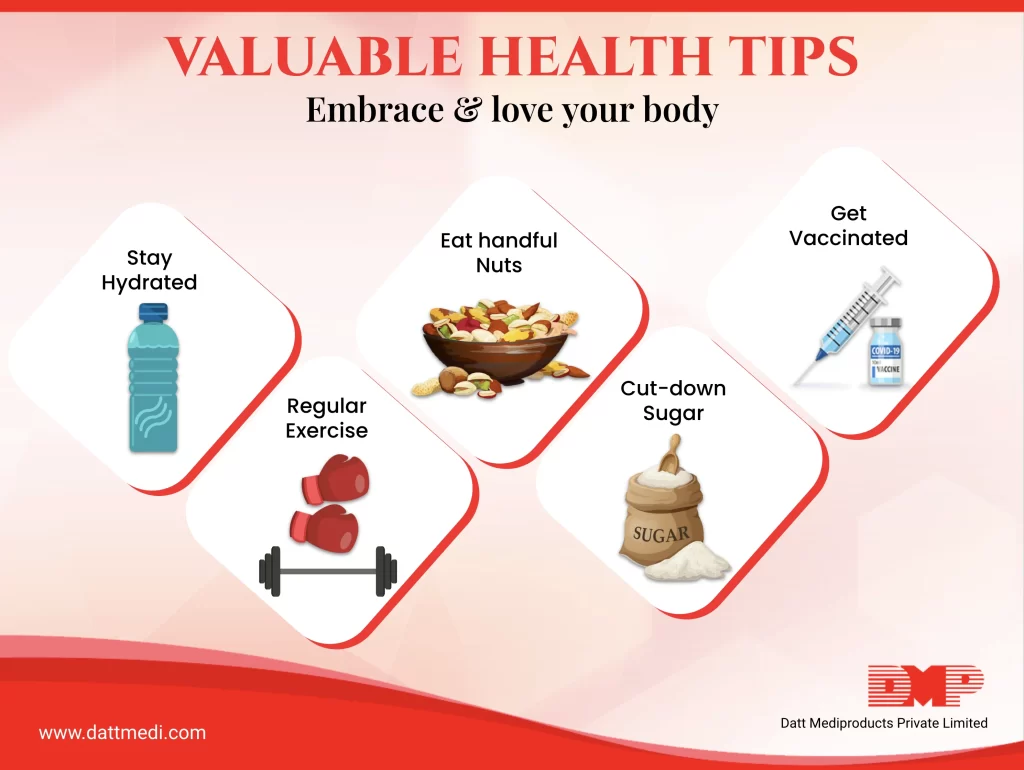
We welcome in the new year with an old quote “You are never too old to set another goal or to dream a new dream.” — C.S. Lewis
With the start of this new year we want to touch back on what is important for our health. It is important we focus on our mental health as well as physical health and fitness. Like every year “Eating healthy”, “staying fit” and “keeping upbeat” will be among the top priorities.
Set realistic goals like waking up early in the morning, doing some yoga and exercise, timely meals, meditation, nurturing your habits and spending time with your loved ones.
These small consistent efforts slowly change our lifestyle for the better and a sense of accomplishment acts as a powerful psychological motivator.
Kick start your New Year with these health tips
– Have a plate full of colours:
Just have a look at your plate, is it a rainbow platter? More colourful plates means a diet full of all essential vitamins and minerals. Have a diet rich in fruits, vegetables, nuts and whole grains. It is usually recommended to “Eat as per the season”, it means eating fruits and vegetables that are in season and fresh in your area at that time of the year.
The AHA (American Heart Association) recommends that “Balance food and calorie intake with physical activity to maintain a healthy weight”
– Keep yourself hydrated:
To keep dehydration at bay drink lots of water. Not only water, but also juices, coconut water, herbal teas and many others also contribute to daily water intake. Juicy fruits and vegetables like watermelon, cucumber and spinach are some of the most hydrating foods.
– Handful of nuts:
New research suggests that handful of nuts empty stomach early in the morning prevents excessive weight gain and even lowers the risk of obesity. Nuts keep us fuller longer and reduce the cravings for unhealthy junk food.
Research suggests that eating nuts:
– Lowers bad cholesterol
– Lowers the level of heart related inflammation
– Reduces the risk of developing blood clots that cause heart attack
– Cut down Sodium:
Potassium and sodium play an important role in the normal functioning of our body.
High Sodium raises our blood pressure and affects our vitals. So replace Sodium with Potassium. Legumes, potatoes, tomatoes, green leafy vegetables, bananas, milk, yogurt, nuts are rich source of Potassium.
National Academies of Sciences, Engineering, and Medicine recommends a Potassium intake of 2,600 mg per day for women and 3,400 mg per day for men.
– Get in some family time:
Break the monotony of the same old routine and spend some time with family and friends doing something new. Small getaways can improve your mood and concentration.
– Get vaccinated against Covid 19:
Recent studies conducted in UK have found that, “third dose of Covid 19 vaccine can boost a person’s resistance to Omicron variant of corona virus by as much as 88 per cent”
– Boost your immunity:
During this pandemic it is important to boost your body’s natural immunity. Ginger, garlic, citrus fruits, broccoli, yogurt, green vegetable, almonds are super immunity boosters available in our kitchen.
– Meditation:
Hormones and neurotransmitters released during meditation are considered to be drug-free approach to treat stress, insomnia and depression.
– Exercising:
Endorphins released during exercise are natural pain relievers and mood boosters. Just kick start your day with yoga, a walk, aerobics or cycling as per your stamina to keep yourself energised throughout the day.
– Invest in hobby:
Nurturing a hobby increases “feel good” hormones and raises a sense of accomplishment, it’s is akin to investing in personal self care. So devote time in hobbies like gardening, reading, cooking, writing and many more.
Adopt these small lifestyle changes and by the end of year see a progressive shift in you!!
With the cold, flu, and viral infections running pandemic this year, washing hands, maintaining hygiene, and staying healthy has become very crucial.
It’s always a win-win situation to adopt simple manageable goals. Firstly, we achieve our targets and secondly, we learn something new about ourselves.
These small lifestyle changes can bring a big progressive shift in you.
Follow us @DattMediproducts for more such informative blogs and daily updates to stay healthy & fit. Because your health is your wealth.




